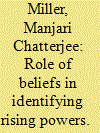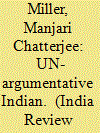|
|
|
Sort Order |
|
|
|
Items / Page
|
|
|
|
|
|
|
| Srl | Item |
| 1 |
ID:
119656


|
|
|
|
|
| Publication |
2013.
|
| Summary/Abstract |
For the last decade, few trends have captured the world's attention as much as the so-called rise of the rest, the spectacular economic and political emergence of powers such as China and India. Particularly in the United States, India watchers point to the country's large and rapidly expanding economy, its huge population, and its nuclear weapons as signs of its imminent greatness. Other observers fret about the pace of India's rise, asking whether New Delhi is living up to its potential, whether the country's shoddy infrastructure will hold it back, and whether it is strong enough to counter an increasingly ambitious China. All of this frenzied discussion, however, overlooks a simple fact: within India itself, the foreign policy elite shies away from any talk of the country's rising status. As a senior official who has worked on India's relations with Western countries recently told me, "There is a hysterical sense, encouraged by the West, about India's rise." A top-level official in India's foreign ministry echoed the sentiment: "When do we Indians talk about it? We don't."
|
|
|
|
|
|
|
|
|
|
|
|
|
|
|
|
| 2 |
ID:
153830


|
|
|
|
|
| Summary/Abstract |
The 70th anniversary year of India's independence after two centuries of British colonial rule provides an excellent occasion to take the measure of a country that, today, is pivotal for both Asian and international stability. At 70, despite the persistent domestic challenges of poverty and inequality,1 India is widely considered a rising power,2 and is indisputably the world's largest democracy. In 2015, the Indian economy grew at a rate of 7.5 per cent, faster than that of China.3 As a nuclear-armed state, India enjoys recognition as a responsible nuclear power by key stakeholders in the non-proliferation regime, despite not being a signatory to the Nuclear Non-Proliferation Treaty.
|
|
|
|
|
|
|
|
|
|
|
|
|
|
|
|
| 3 |
ID:
191751


|
|
|
|
|
| Summary/Abstract |
Why do victim states not ask for redress from perpetrator states? Focusing on former extractive colonies, the vast majority of which, despite having suffered brutal colonial rule, have not asked for redress—apologies, reparations or restitution—from their former colonizers, this article argues that the content of historical narratives in the victim state matters for interstate redress. When meta and sub-narratives in victim states do not conform with each other, framing and consensus mobilization on interstate redress is stymied. To show this, I code interstate redress in the Correlates of War data set of colony/colonizer states, and then use primary sources—interviews and school textbooks—to examine two victim states: Namibia, a ‘less likely’ case which has sought interstate redress, and India, a ‘more likely’ case which has not. Academic and policy conversations on interstate redress have thus far largely focused on perpetrator states. This not only denies victim states, most of which are developing countries, agency but skews our understanding of the phenomenon of seeking justice across international borders.
|
|
|
|
|
|
|
|
|
|
|
|
|
|
|
|
| 4 |
ID:
153832


|
|
|
|
|
| Summary/Abstract |
In the post-Cold War era, a number of scholars have observed and encouraged greater ‘pragmatism’ in India's foreign policy. A ‘pragmatic’ foreign policy has been understood as one that rejects India's earlier reliance on Nehruvian ‘idealism’ or ‘moral posturing’, and instead pursues power and material interests. In the wake of his election to power, Prime Minister Narendra Modi, too, has been celebrated by scholars and the media as a pragmatic leader who will be able to dispense with earlier ideas and ideologies and bring about radical changes to Indian foreign policy. In this article, we problematize these ‘substantive’ readings of pragmatism. Instead we present an alternative, ‘procedural’ reading of foreign policy pragmatism that emphasises the selection and fusion—rather than the abandonment—of different ideas and ideological commitments in order to effect foreign policy change. By demonstrating procedural pragmatism at work in two case-studies under Modi's leadership—the resolution of India's territorial dispute with Bangladesh, and the establishment and public celebration of a UN-recognized International Day of Yoga—we show how Modi's pragmatic approach to foreign policy-making is responsive to both Hindutva (Hindu nationalist ideology) and entrenched foreign policy ideas in India. Our central argument is that Modi is neither unique nor uniquely pragmatic, and like many Indian leaders before him, his pragmatism cannot simply abandon ideas and ideology, but is compelled to respond to them in response to domestic and international political logics.
|
|
|
|
|
|
|
|
|
|
|
|
|
|
|
|
| 5 |
ID:
091580


|
|
|
|
|
| Publication |
2009.
|
| Summary/Abstract |
As rising powers, India and China are critical to regional and global stability in the twenty-first century. While most analyses of their behavior emphasize their material capabilities as an explanatory variable, this article takes into greater account the role of the past. This involves how they both operate under a "post-imperial ideology" (PII), an emphasis on colonial trauma and "victimhood," exemplified in their still unresolved territorial dispute. Using new documents, this article shows how PII led to the breakdown of the negotiations between the two sides and war in 1962. PII not only suggests a new way to think about two important rising powers today, China and India, it also offers a new way to think about states in the international system.
|
|
|
|
|
|
|
|
|
|
|
|
|
|
|
|
| 6 |
ID:
145550


|
|
|
|
|
| Summary/Abstract |
The concept of rising powers is central to international relations, and it is considered crucial for answering questions about war and peace. Yet the theoretical literature on rising powers is surprisingly sparse and highly contentious. One of the biggest shortcomings in this literature is that rising powers are conceptualized only in terms of their material capabilities, that is, their relative economic and military power. As a result, there is little agreement on who is a rising power, when they rose, and when they became or will become a great power. Drawing on primary and secondary sources, this article argues that rising powers are distinguished by very specific kinds of domestic beliefs. It uses two detailed cases, one historical (the United States 1898–1903) and one contemporary (China post-2002), to show that rising powers, despite different time periods, regimes, and cultures, have very particular kinds of beliefs about how to become a great power. It uses two additional mini cases, India post-2002 and Weimar Germany 1922–1933 to argue that if beliefs are not taken into account, states may be overestimated or underestimated as rising powers.
|
|
|
|
|
|
|
|
|
|
|
|
|
|
|
|
| 7 |
ID:
129994


|
|
|
|
|
| Publication |
2014.
|
| Summary/Abstract |
While India is internationally acknowledged as a rising power, there is a surprising lack of responsive ideas and discussion about India's rise within the country. This stands in sharp contrast to China, the other rising power, where domestic discussions of China's rise are expansive and broad ranging, and often seek to shape international perceptions of China. This article argues that India does not respond to international discourse about its rise as prolifically as China because of the benign content of international ideas about its changing status, as well as a statist domestic structure that is resistant to ideational diffusion.
|
|
|
|
|
|
|
|
|
|
|
|
|
|
|
|
|
|
|
|
|